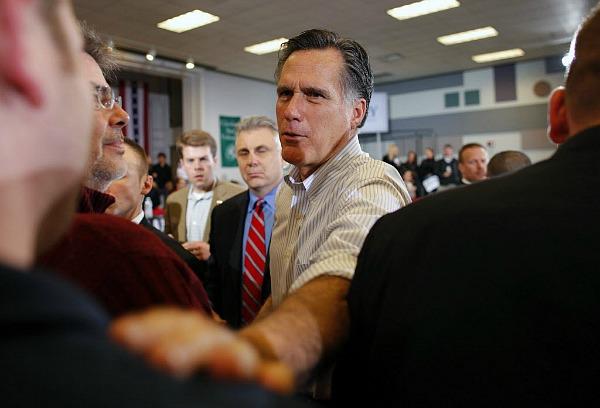Super Tuesday Delegate Trouble For Mitt Romney

There has been more than one declared "Do-or-Die" situations for various Republican presidential candidates so far in this year's tumultuous primary election cycle. When it comes to delegate count, Mitt Romney's camp should be looking toward victory in today's results as a mathematical obligation.
Without major wins, this primary season is guaranteed to drag on into summer, if not through the doors of the Republican National Convention in Tampa. If Romney fails to sweep today's contests, his campaign's chance at a forced nomination is all but dead in the water.
A brokered convention, while still lampooned in the media, is becoming increasingly probable.
Legally bound delegates are the issue. It's an inevitable fact of primary election dynamics that both Dr. Ron Paul and former Speaker Newt Gingrich's campaigns seem to understand. It's more than likely why they are both still in the race.
To date, there have been only 214 bound delegates allocated. Despite hosting primaries or caucuses, Iowa, Maine, Colorado and Minnesota are not legally binding. Iowa and Maine, for those with good memory, are both states Ron Paul had a good, deliberate showing.
For Super Tuesday there are be 382 legally bound delegates in play. North Dakota and Wyoming delegates are not legally bound.
In order to win the Republican nomination prior to the Convention, a nominee needs to accrue 1,144 out of 1,762 legally bound delegates. One needs 65% of bound delegates to be the presumptive nominee going into Tampa this summer.
Current count puts Romney optimistically at 146 bound delegates. This number plunges to 112 if questions about certain states proportional allocation systems are considered.
If Romney splits the Super Tuesday contests today, he'll get to 191. That would put him at around 337 of the 1,144 he needs, or at under 30% of bound delegates.
After a split, even if you generously give Romney victories in all remaining winner-take-all states, he would still need to win 321 of the remaining available 784 delegates in order to win the nomination before the Republican National Convention.
With remaining states like Alabama (47), Arkansas (33), Louisiana (25), Mississippi (37) and Texas (155) accounting for 297 delegates up for grabs, the math simply does not add up for Romney to optimistically expect a legally bound pre-convention nomination. In fact, the proportionality rules make it near impossible.
What's interesting to observe, is the media positioning of Romney against former Senator Rick Santorum, as opposed to Ron Paul or Newt Gingrich.
Due to a laser-like focus on smaller caucus states and election protocol, Paul has garnered a sizable number of bound delegates. His campaign has also followed through expertly on the ground in individual states. Well after the rest the GOP field has moved onto the next campaign battleground, Paulites stick around. This strategy could prove golden going into a brokered Republican Convention where legally bound delegates would be released and could freely choose their allegiance. There are many Paul supporters positioned in important state and county-wide Republican seats, for this very reason.
Santorum, on the other hand, is barely on the board in terms of bound delegates. He has a big disadvantage on the ground, with little-to-no infrastructure. Most of his big "wins" result in little-to-no delegate allocation.
If mathematically Romney has to worry, Santorum should be desolate.
Except for the fact that by hanging on, it ensures each candidate longer time on the national scene and more of a chance to win concessions, or speaking slots, at the Convention. Given the current outlook, results tomorrow will be a mixed bag. The primaries will press on. Looming in the distance is the first brokered convention since 1952.





